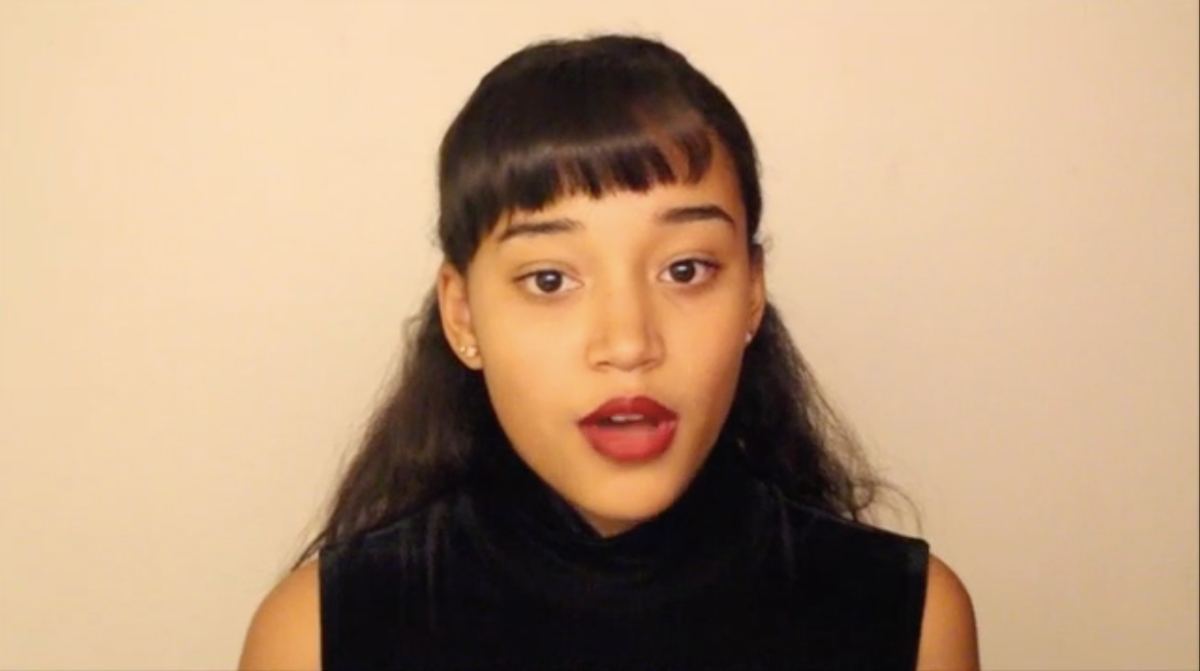Does your son or daughter need a black pride tune-up?
 breaks down cultural appropriation (Courtesy of Amandla Sternberg) " title="screen-shot-2015-07-29-at-4-24-53-pm" width="1" height="1"/>
breaks down cultural appropriation (Courtesy of Amandla Sternberg) " title="screen-shot-2015-07-29-at-4-24-53-pm" width="1" height="1"/>
16-year-old Amandla Stenberg breaks down cultural appropriation (Courtesy of Amandla Sternberg)
The other day my 14-year-old son waffled on his identity. He has a black mother and a Spanish father so deciding what to call himself has always been a matter of debate. Black? Mixed? Blanish?
I’ve kept that door open for my children. I’ve allowed them to call themselves whatever seems natural for them. Identity labels are really only utilized on official government documents and the occasional camp admission form so it’s honestly not something I spend a lot of time fretting over.
What I do worry about however, is not what they call themselves on paper, but what they feel about the two different cultures that make up their unique blend. When my son mentioned that he wasn’t “officially black” the other day, arguing that since he is also Spanish he doesn’t really qualify as one of my tribe, I sighed and realized it was time for a “black pride tune-up.”
Like a car that requires a visit to the mechanic every 5,000 miles, I think black kids in America need a black pride tune-up on a regular basis to keep them running strong and proud of their culture and heritage.
Given today’s headlines highlighting police brutality in the black community, is it any surprise that our black sons and daughters might not be feeling good about themselves these days?
Worse, they might be suffering from feelings of fear, shame, powerlessness or depression. I’m an adult and I feel these things reading the headlines, so clearly something has to be done for our children.
Here’s what I’m doing for this month’s black pride tune-up.
Bonus: Your kids do not have to be black to get a black pride tune-up. This knowledge and information works for all open minds.
And keep in mind, just as you regularly change your oil, put air in your tires and clean your car out, these tune-up tips require regular maintenance.
Assume a position of superiority Black-American children are bombarded with images and signals that they are an inferior race. Flip that narrative and point out that despite the violent oppression black people faced from their first moments in the United States, they managed to not only survive but thrive in a country determined to get rid of people of color. Black people can be many things, but not inferior. Note that in order for this lesson to stick, parents must take care to repeat this narrative often.
Curate your child’s media experience Short of throwing the television out of the window and canceling your internet package, it is almost impossible to keep children unaware of what’s going on in the world, but you can certainly try to balance what it is they are seeing and hearing. Based on the age of your son or daughter, you may want to simply turn the news off for a bit because all of the negativity can be too much. In the meantime, do your best to showcase positive stories that highlight positive black news events. Good things do happen to black people but the mainstream media doesn’t always find them compelling enough to talk about, so you might have to do a little extra work to find them. But it’s worth it for your child to see black people doing fabulous and fascinating things. Ahem, Neil deGrasse Tyson.
Don’t depend on Frederick Douglass to plead your case If you ask your tween or teenager to pick up a copy of “Narrative of the Life of Frederick Douglass” and then expect them to walk out the door enlightened and inspired about their life as a 21st century black kid, you are fooling yourself. Kids need modern-day black heroes they can relate to and look up to. And it’s better if you act nonchalant about why you want them to read a certain book or watch a particular movie. I was causally reading Issa Rae’s new memoir “The Misadventures of Awkward Black Girl” and my son asked if he could read it. Score! And he doesn’t know it, but he’s going to read Barantunde Thurston’s “How to Be Black” after that. Then, I’m going to coincidentally be checking out 16-year-old Amandla Stenberg’s Tumblr where she breaks down things like cultural appropriation in a way that my kids will be able to appreciate.
At the end of the day, this black pride tune-up only works with parents who are willing and ready to combat the negativity our children face on a daily basis. Children need to be aware of reality and current events, but they also need to grow up with hope and inspiration. As parents, it is our job to give them the hope. The rest of the world will fill them in on the negativity.
Let’s do this!
WHYY is your source for fact-based, in-depth journalism and information. As a nonprofit organization, we rely on financial support from readers like you. Please give today.

